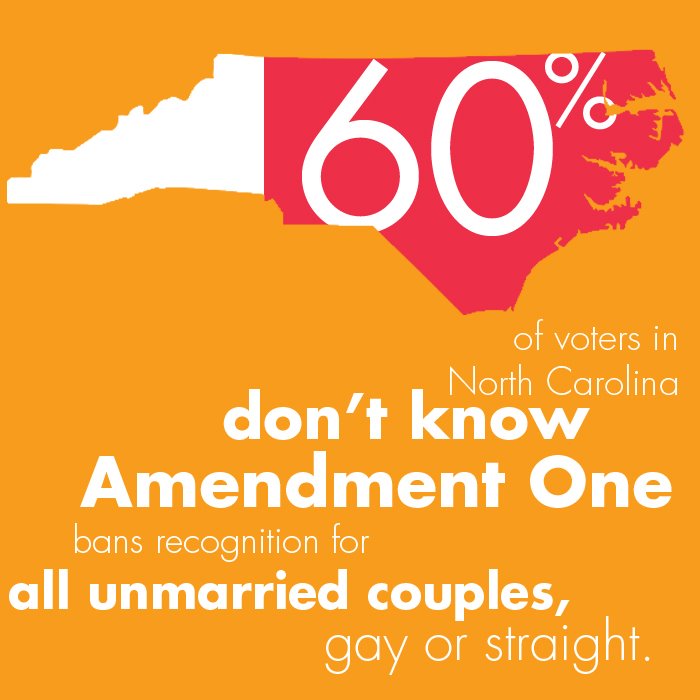By Brittny Drye
As voters in North Carolina head to the polls on Tuesday, May 8 to vote on Amendment One, which, if passed, will ban legal recognition for all unmarried couples, a recent poll suggests that 60 percent of North Carolinians will not even realize what they’re voting for.

Supporters of Amendment One’s battle cries have been against same-sex marriage and pastors preach from their pulpits to keep marriage between a man and a woman by voting for the bill. In order to gain momentum for the legislation, supporters have strategically avoided the amendment’s loose terminology, which umbrellas all types of domestic partnerships—straight and same-sex.
“The fact of the matter is this amendment would do far more. It would certainly ban civil unions. It would ban domestic partnerships at the state level and it would also ban the domestic partnership insurance benefits that a number of municipalities and counties currently provide to their employers,” states Maxine Eichner, a law professor at UNC School of Law, in a video released by Protect All NC Families.
Beyond denying civil unions rights to same-sex couples, Amendment One will do the following:
- A single or widowed senior couple could be forced to marry to keep their legal protections, which would cause them to lose benefits such as pensions, health care and social security.
- The broad amendment’s interpretation will be shifted to the courts, which will result in cases taking years to be resolved.
- Many unmarried partners, both straight and same-sex, currently have the right to make medical decisions in the event that their significant other is unable to do so. If Amendment One is passed, it is highly unlikely that the state will ever be able to offer that right to unmarried partners again.
- A child of an unmarried parent could lose their health care and prescription drug coverage, putting the child’s health at risk.
- A child could be taken away from a committed parent who has loved them their entire life if something happens to the other parent.
- It threatens existing child custody and visitation rights that are designed to protect the best interests of a child.
- Victims of domestic violence who are not married to their attacker cannot use the domestic violence legislation in court.
View video below to watch North Carolina family law professors explain the harms of Amendment One.
Photo: glaad.org
MOST VIEWED STORIES
- These nonbinary cosplay lovers brought anime to life for their ethereal wedding
- Sweet lesbian proposal on a gondola [VIDEO]
- Navy and green wedding for Disney lovers in Beacon, New York
- Ensuring Inclusivity: 5 Considerations for Guests with Disabilities on Your Wedding Day
- Greenhouse wedding in Downtown Los Angeles for two brides


























